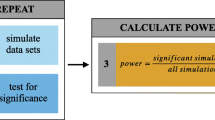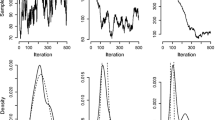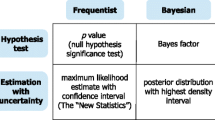Summary
This essay presents a measure-theoretic version of the random utility model with no substantive restrictions upon the choice space. The analysis is based upon DeFinetti's Coherency Axiom, which characterizes a set function as a finitely additive probability measure. The central result is the equivalence of the random utility maximization hypothesis and the coherency of the choice probabilities over all allowable constraint sets.
Similar content being viewed by others
References
Clark, S. A.: The valuation problem in arbitrage price theory. J Math Econ.22, 463–478 (1993)
Cohen, M. A.: Random utility systems — the infinite case. J. Math. Psychol.22, 1–23 (1980)
DeFinetti, B. Foresight: Its logical laws, its subjective sources. Ann. Inst. Henri Poincaré7 (1937). Reprinted in: Kyburg, H. E., Smokler, H. E., Krieger, R. E. (eds.). Studies in subjective probability. Huntington, N.Y.: Publishing Co. 1964
Falmagne, J. C.: A representation theorem for finite random scale systems. J. Math. Psychol.18, 52–72 (1978)
Farkas, J.: Theorie der einfachen Ungleichungen. J. Reine Angew. Math.124, 1–27 (1902)
Fishburn, P. C.: Induced binary probabilities and the linear ordering polytope: A status report. Math. Soc. Sci.23, 67–80 (1992)
Heyer, D., Niederée, R.: Generalizing the concept of binary choice systems induced by rankings: One way of probabilizing deterministic measurement structures. Math. Soc. Sci.23, 31–44 (1992)
Hildebrand, W.: Random preferences and equilibrium analysis. J. Econ. Theory3, 414–429 (1971)
Marley, A. A. J.: A historical and contemporary perspective on random scale representations of choice probabilities and reaction times in the context of Cohen and Falmagne's (1990) Journal of Mathematical Psychology results. J. Math. Psychol.34, 81–87 (1990)
McFadden, D., Richter, M. K.: Stochastic rationality and revealed stochastic preference. Department of Economics, MIT 1970. (Reprinted in: Chipman, J. S., McFadden, D., Richter, M. K. (eds.) Preferences, uncertainty, and optimality, pp. 161–186. Boulder, CO: Westview Press 1990
McFadden, D.: Econometric models of probabilistic choice. In: Manski, C. F., McFadden, D. (eds.) Structural analysis of discrete data with econometric applications, pp. 198–272. Cambridge, Mass: MIT Press 1981
Peressini, A. L.: Ordered topological vector spaces. New York: Harper and Row: 1967
Resnick, S. I., Roy, R.: On min-stable horse races with infinitely many horses. Math. Soc. Sci.23, 119–145 (1992)
Suppes, P., Krantz, D. M., Luce, R. D., Tversky, A.: Foundations of measurement, Vol. II. New York: Academic Press: 1989
Varian, H. R.: The arbitrage principle in financial economics. J. Econ. Perspect.1, 55–72 (1987)
Author information
Authors and Affiliations
Additional information
The author expresses gratitude to the participants in the 1990 U.C. Irvine summer workshop in measurement theory, where the germ of the idea for this paper was born, and to Kurt Helmes for invaluable discussion.
Rights and permissions
About this article
Cite this article
Clark, S.A. The random utility model with an infinite choice space. Econ Theory 7, 179–189 (1996). https://doi.org/10.1007/BF01212189
Received:
Revised:
Issue Date:
DOI: https://doi.org/10.1007/BF01212189




